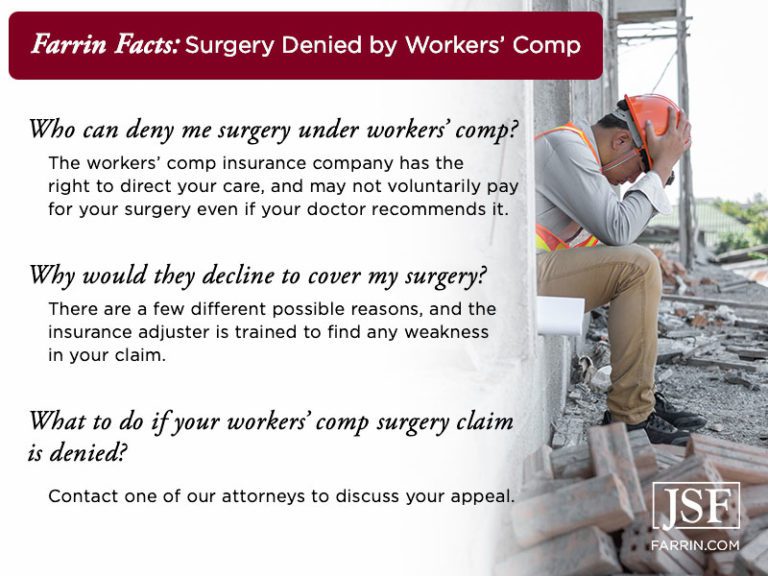If Workers Comp Surgery Denied What Happens?

If Workers Comp Surgery Denied What Happens
Finding out your workers' compensation surgery has been denied can be a difficult and stressful experience. When confronted with this situation, you may be unclear about what happens next. We will cover what options you have if your claim is denied and provide tips to avoid a denial in the first place.
What Happens When Workers’ Comp Surgery Is Denied?
When a request for a surgery on a workers' compensation claim is denied, it means the medical review board for the state's workers' compensation board has concluded there is not enough evidence to prove the surgery is necessary for an injured worker's disability or medical condition. Depending on the state you live in, you may have the opportunity to appeal the decision to the workers' compensation board.
If the denial is upheld, it is important that an injured worker does not proceed with the recommended surgery, as the workers' compensation insurance will not pay for it. An injured worker may, however, contact their private health insurance provider to inquire about coverage for the procedure. Other healthcare options may include providing a copy of the denial of your claim to a hospital or clinic with a sliding fee scale, or taking out a loan.
How to Avoid a Denial?
There are several steps an injured worker can take to avoid being denied workers' compensation surgery. Before submitting a claim for workers' compensation surgery, make sure your doctor has thoroughly explained the medical benefits of the surgery and the process of rehabilitation recovery afterward. Complete medical records and associated documentation should be provided to the workers' compensation board at the time of the claim.
Another way to reduce your chance of denials is by understanding your rights and the workers' compensation process. Knowing what to expect and filing your claim correctly can go a long way to increasing the odds your surgery is approved. Make sure to keep copies of everything related to your workers' compensation claim, including treatment notes, workers' compensation claim forms, and other doctor or hospital records.
Workers' compensation surgeries should address medical issues that are as a result of an on-the-job injury. The recommended surgery should fall into line with the accepted protocols of your state's workers' compensation board. It is important to note that if your doctor recommends a surgery based solely on personal opinion or preference, the claim is more likely to be denied.
Conclusion
The best way to protect your rights after a workers' compensation surgery is denied is to understand the workers' compensation board's guidelines and procedures in your state, and continue working with your doctor and legal counsel to appeal the decision. Contacting your state's department of labor can provide more information about appealing a workers' compensation surgery denial.
At the end of the day, if you have sustained an on-the-job injury, it is important to remember that you are entitled to payment for medical care to treat your injury, and approved surgeries should be covered by workers' compensation. In the event your surgery is denied, you have the right to review the decision and provide any new information that could help bring the claim to a fair ruling.
Post a Comment for "If Workers Comp Surgery Denied What Happens?"